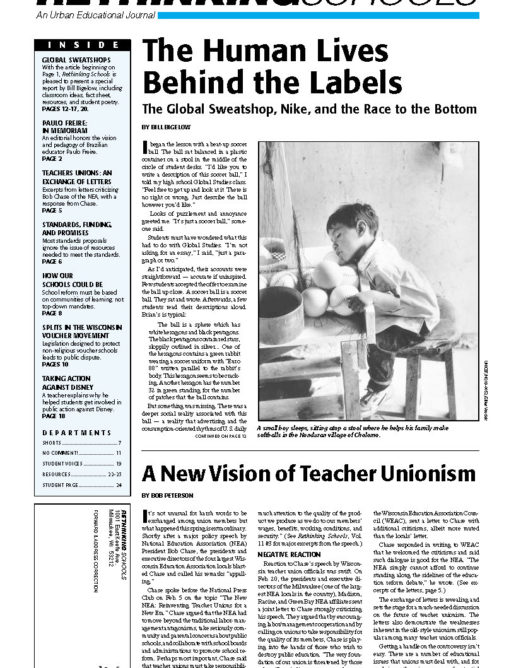The Loss of Paulo Freire, 1921-1997
Paulo Freire died on May 2 in Sao Paolo, Brazil, and educators throughout the world mourn our loss..
For many of us, Freire was the one who married politics and teaching, the one who dared us to teach students not only to read and write but to “read the word and the world.” Skills alone are not enough, he taught us; the point of education must be to illuminate reality, to unmask how domination works. And he emphasized that teaching could be part of changing society.
In the early 1960s, a man living in Recife, Brazil explained why he wanted to conquer his own illiteracy: “I want to learn to read and write so that I can stop being the shadow of other people.” Paulo Freire dedicated his life to helping people emerge from the shadows to transform their own lives, and to challenge the oppression that thrives on and perpetuates ignorance. His death saddens educators who seek to intertwine learning and struggles for social justice.
Born in Recife in 1921, Freire earned a law degree but spent most of his life as an educator. His career encompassed university extension projects in Brazil, the establishment of literacy programs in Chile, Nicaragua, and Guinea-Bissau, international consulting, and, toward the end of his life, three years as education secretary for Sao Paolo, Brazil’s largest school system. He authored two dozen books, including the highly influential “Pedagogy of the Oppressed,” published in 1970.
Freire formulated his ideas during the late 1950s while leading literacy campaigns among poor Brazilian peasants. In Freire’s approach, literacy workers studied the lives of their students and derived a curriculum in which politically-charged words and images, “generative themes,” evoked discussions on exploitation, the meaning of culture, and the power of written language. Explicitly rejecting “banking” modes of instruction where the teacher acts as an authority stuffing the heads of students with inert facts, Freire and his collaborators invented an approach that encouraged participants to reflect with each other and to draw deeply upon their collective experience to grasp how society functioned. In this endeavor, teachers acted as partners in learning, deeply respectful of the knowledge that each participant brought to the class.
Freire and his colleagues began to achieve notable success and planned to expand their work by creating 20,000 “culture circles” throughout Brazil. Not surprisingly, the generals fomenting the 1964 coup that ended democracy in Brazil considered both Freire and this project serious threats to a status quo that rested on vast inequalities of wealth and power. After the coup Freire was jailed and then exiled for fifteen years.
A Profound Legacy
The Brazil of the early 1960s was a different world from the United States of the 1990s; Freire himself emphatically rejected the notion that he had designed some generic blueprint for educational liberation. And his dense prose did at times suffer from vagueness and a lack of examples. Nonetheless, for teachers here, Freire leaves a profound legacy. Steadfastly opposed to teaching as indoctrination, he insisted that learning is inescapably political and that educators should help students articulate their own vision of social justice. He argued for a pedagogy that draws on the lives of our students to engage them in asking critical questions about the larger society. And he challenged those who oppose the deadening effects of schooling not to conclude their critique with mere symptoms. “[B]y criticizing traditional schools,” Freire said, “what we have to criticize is the capitalist system that shaped these schools.”
His writings stand in sharp contrast to U.S. educational debates and practices too often tainted by contempt for the learning abilities of poor people, crude efforts to focus schooling on vocational tracking, and hierarchical methods of instruction that insult the intelligence and humanity of students. Pious declarations that schools should promote good citizenship hardly obscure the overwhelming emphasis placed on competition, personal advancement, and knee-jerk patriotism. In Freire’s words and deeds we can find practical inspiration to counter such trends by exploring ways to make learning lively, democratic, subversive of privilege, and capable of merging the quests for personal and collective liberation. We can find tools to work toward, as he put it, “education as the practice of freedom.”

